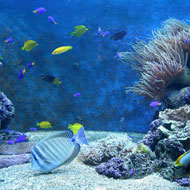Majority of reptiles and fish die within a year

Around 40 million pet fish are imported annually into the UK.
The majority of pet reptiles and fish either die before they can be sold, or within their first year in the home, according to a damning report published in the Ecologist.
Quoting figures from WWF and the Ecologist, author and medical scientist Clifford Warwick said about 80 per cent of wild-caught marine fish die pre-sale. Of the 40 million pet fish imported annually into the UK, almost all die within just one year.
Meanwhile, around 70 per cent of reptiles die before sale and a further 81 per cent die within a year of being sold.
The article, titled 'The exotic pet trade is a global evil that must be stopped', describes the exotic pet industry as unsustainable and estimates a quarter of the trade to be illegal.
Furthermore, the article raises concerns about the number of exotic pets being released into the wild and potentially introduce novel pathogens impacting human and livestock health. In London alone, there are thought to be at least 51 types of released reptiles and amphibians.
Clifford Warwick, who has been a field biologist for 30 years, said: "Long overdue is the need to haul this industry's modern-day dark-age habits to face the cleansing light of scientific scrutiny, neo-political good will, and common sense morals.
"Evidential and ethical arguments overwhelmingly justify a complete ban on trading exotic animals as pets. Already available, however, are so-named 'positive lists' - which turn the historical 'free trade' concept around and stipulate 'no trade until proven safe'.
"This approach offers a pro-active and not reactive opportunity to favour wildlife over the deepening pockets of pet peddlers. But so long as the exotic pet trade continues, its maleficence will persist to the detriment of animals, humans and the world in which we live".
For the full report, visit: www.theecologist.org



 The RCVS has announced a new version of its 1CPD mobile app, with enhanced features for veterinary surgeons and veterinary nurses to record their continuing professional development.
The RCVS has announced a new version of its 1CPD mobile app, with enhanced features for veterinary surgeons and veterinary nurses to record their continuing professional development.